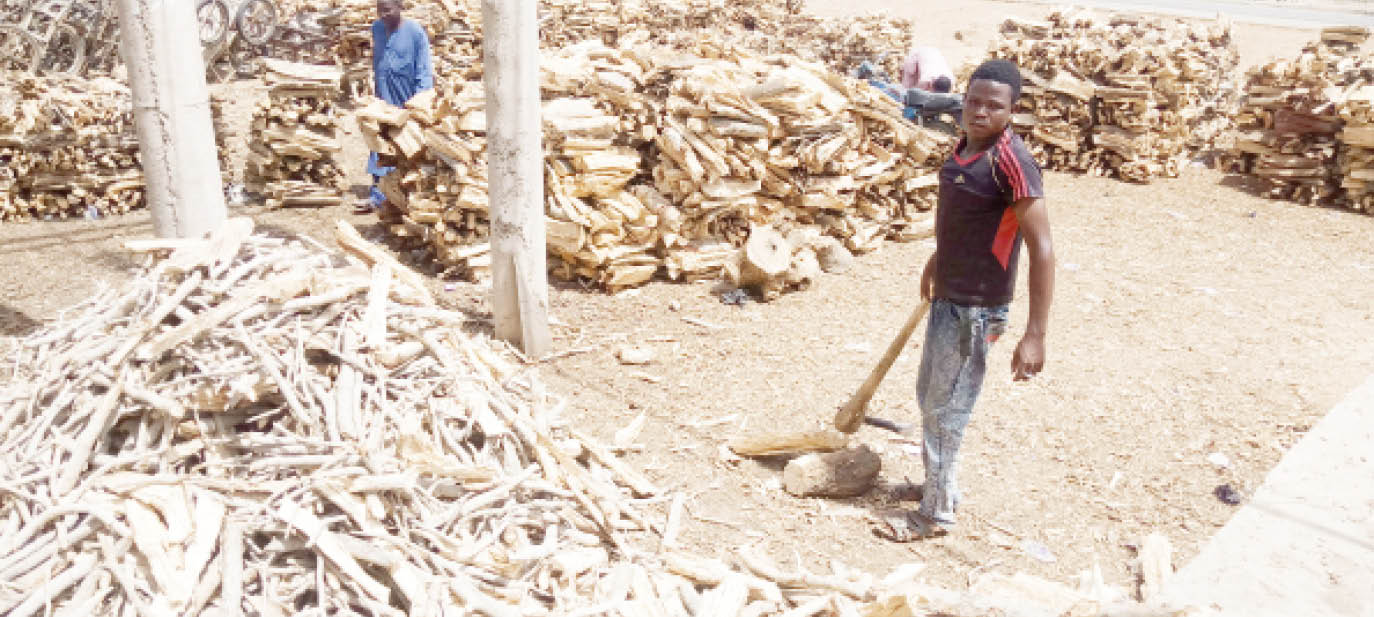Many residents in Kano are increasingly resorting to traditional ways of cooking, owing to the rising cost of cooking gas, a development that has negative consequences to the environment. Daily Trust on Sunday reports.
Charcoal and wood fuel or firewood are the traditional sources of energy for cooking many residents had abandoned but lately reconsidered by some households due to the high cost of cooking gas.
- Drama as Obasanjo rides tricycle in Abeokuta, picks passenger
- NIS rescues 20-year-old pregnant woman from human traffickers
Isma’il Adamu sells charcoal at Dorayi Karshen Waya, one of the major trading centres in the city. He said that due to the high cost of cooking gas, the market has changed.
“We have more customers now; and every day we receive new ones. While many of the new customers are not familiar faces, some of them are people we knew as cooking gas clients. Others are previous customers who changed to cooking gas but are now back,” he said.
Adamu, however, said that although there is an influx of customers for charcoal, the price of the product had not changed. A bag of the commodity costs N2,600 but there are small packages for N300, N200 and N100.
The major challenge of the charcoal business is forestry staff who usually impound the supply to ensure that forests are protected, but Adamu claimed that, “the suppliers pay N100 per bag before getting the charcoal out from the forest.”
On his part, a wood fuel vendor in the city, Muhammad Sani, said the market had improved, which led to an upward review of the price from N200 to 250 per pile of firewood.
He said that before the increase in the price of cooking gas, his maximum turnover was between N5,000 to N6,000 in a day but that had doubled as he could generate N12,000 daily now.
Sani said, “Whenever the price of cooking gas increases, firewood market also progresses as many households compare prices of cooking energy sources to make convenient decisions toward meeting family needs.”

Yusuf Abdullahi, another firewood vendor in the city, said the market had changed and the situation would continue up to mid rainy season when wood fuel demand would reach its peak.
“One of my customers just left, lamenting that after changing from cooking gas to charcoal, he realised that even the charcoal was not a better alternative in his house. He said wood fuel was the answer to household cooking energy needs,” he said.
The Nigerian Association of Liquefied Petroleum Gas Marketers (NALPGAM) said national cooking gas demand had dropped by 38 per cent. The president of the Nigerian Gas Association, Ed Ubong, at a downstream function in Lagos as reported last month, said “gas consumption has dropped due to high prices.”
The National Bureau of Statistics (NBS) Cooking Gas Price Watch Report published in May indicated that the average retail price for cooking gas or Liquefied Petroleum Gas (LPG) on a year-on-year basis, increased by 83.67 per cent from N2069.21 in April 2021. The NBS also reported that the average retail price per litre of kerosene on a year-on-year basis rose by 62.63 per cent from N362.68 in April 2021.
It was gathered that the hike in LPG has not only reduced the demand for the product but also led some plants and roadside vendors to suspend operations, which is “a step backward in the gains so far achieved by the gas expansion policy of the government,” according to stakeholders in the industry.
On its part, the Kano Gas Marketers Association said that apart from the low demand of the product in the city, there are some people who smuggle low standard LPG from Niger Republic into the state.
The financial secretary of the state Marketer’s Association, Sani Ibrahim Babankowa, said increment in the LPG price from depots, and high transportation cost, were the two major reasons for the increase in cooking gas price in the state.
Babankowa lamented that, “Our company (AA Gas) is a well-known gas plant in Kano. We have been operating since 1995, but we are going to suspense operation after selling our remaining stock because the LPG price is going up every day, our current retail price is even cheaper than the depot price at the moment. Customers are deserting and plants will soon begin operating at a loss.”
He also said in that order to prevent smuggling the low standard LPG from Niger into the state, they informed Customs, Department of State Services (DSS) and the gas marketing licensing agency about the illegal activities of smugglers and its attendant consequences to customers and the sector.
A staff at one of the major gas plants in the metropolis who preferred to be anonymous said that before the hike they used to sell N4 million to N5 million worth of gas in one shift in a day, but now, the plant hardly sells N1 million gas within the same period.
He said another challenge of the cooking gas business at the moment was the high cost of diesel, adding that transportation costs and daily expenses of running the business in operating generators had almost tripled.
Earlier, in an open letter to the Minister of State for Petroleum Resources published in Daily Trust on November 8, 2021, NALPGAM identified reasons that pushed the price of LPG upward.
The association said, “The obvious devaluation of local currency, inability to access foreign exchange by importers, the increasing international price against, which the cost of domestic LPG is indexed, as well as anticipated re-imposition of Value Added Tax (VAT) and Custom duties, with retrospective application, have all contrived to push the price of LPG upward.”
Professor Ibrahim Baba Yakubu of the Department of Environmental Management, Bayero University, Kano, said the issue of energy was very serious because nothing could take place socio-economically without energy, especially household energy.
He said household or cooking energy had a ladder that consists of lowest (biomass) to highest (nuclear) energy. The ladder starts from biomass (crops residues, cow dung, wood), kerosene, LPG, electricity, and finally, nuclear. Therefore, the energy sources are divided into cleaner and less clean energy.
“When income rises, people tend to migrate from the lower energy (biomass) to cleaner energy (kerosene, LPG, electricity or nuclear). And when income fluctuates or declines, the tendency is that those who are using cleaner energy tend to shift downward to less cleaner energy sources,” he said.
Prof Yakubu added that ordinarily, biomass should be left to decay in the farm, but due to economic downturn, people still use it in towns and villages. “It is not surprising that people are now migrating downward in Nigeria because of hyper-inflation. We have two digits inflation today in the country and people cannot afford to buy LPG any longer; that is why the demand is declining.
“The downward migration in household energy use has direct and indirect consequences. The direct consequence is that it increases deforestation, then environmental quality declines, while the indirect consequence leads to having fewer trees; and the trees are there to keep the soil; they are like umbrellas protecting the soil.”
The way out
The NALPGAM, in its open letter to the minister of state for petroleum resources, recommended some strategies the federal government could adopt to address the daily increasing price of gas and save Nigerians the ordeal of finding solace in the use of charcoal and firewood.
Part of the recommendations suggested by the association include that the re-imposition of VAT and customs duties on imported LPG should be suspended and the LPG produced by NLNG should be priced based on the local currency and not against the dollar.
Babankowa also suggested that the government should provide LPG in abundance in the country to stop its importation, control the price and ensure that only registered and genuine companies, not cronies, receive direct allocation from the NLNG.
On his part, Prof Yakubu said the government needed to do a lot of sensitisation on the danger of indiscriminate cutting of trees and the importance of protecting the environment.
He said the government could also subsidise initial investment in acquiring cooking equipment (cylinder and cooker) to workers at lower cadre and ensure availability of the LPG and HHK in the country.
By Gambo S. Nababa, Kano

 Join Daily Trust WhatsApp Community For Quick Access To News and Happenings Around You.
Join Daily Trust WhatsApp Community For Quick Access To News and Happenings Around You.


